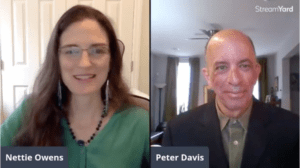Why is it so difficult to transition into a leadership position?
Let’s start with the age-old question: Are leaders born or made?
Leaders are definitely made. Some people are born with a certain amount of charisma and know-how to lead, but most leaders are made.
The problem is that in most organizations, people are promoted into leadership roles without education. And I always say, “Can you imagine if you had a teenager, and it was time for them to learn to drive. and you just said, ‘Here are your car keys! Off you go and drive!’” You would never do that. It’s the same with the leadership role.
Why do organizations promote people into leadership positions and then basically say, “Drive!”? Because most people learn to be an architect or an engineer, or whatever their skill set is when they’re in college and university, and then go into the work world. They become an expert in that area and get promoted into leadership – because they’re good at their job. But leading involves a completely separate set of skills.
“In her book “Mindset: The New Psychology of Success” Carol Dweck wrote, “Growth mindset is based on the belief that your basic qualities are things you can cultivate through your efforts.” And with this mindset, leaders can definitely be made.”
What does learning leadership look like?
Leadership is vast. It’s complex. And the first thing that I do is always break down leadership into three pillars. I assess my clients against these three pillars and where they have gaps, we then focus on development.
The first pillar is know myself. Leaders must be self-aware.
The second pillar that’s critical for leaders is manage my team. You have to know how to coach how to develop your people, how to give feedback, and have crucial conversations.
The third pillar is lead my business. Leaders have to know how to execute strategically. For example, a lot of leaders will say to me, “Vanessa, my boss has told me I need to be strategic, but I don’t know what that means.” So, that’s an example of a skill that I teach people. I teach them that there are three parts of strategy. They learn exactly what it looks like to be strategic.
In that “lead my business” section, change management and leading change are skills that I teach my clients as well. All leaders have to lead and manage change, especially in today’s environment. But they don’t know that there are a set of skills and tools that you can leverage to communicate change and to bring people along in terms of changing their mindset, so they’re more aligned when it comes to your change plan.
You have to give feedback, but a lot of times, people fear feedback because they don’t know how to give it properly. But that’s a skill that you can learn. There are tools associated with giving constructive feedback that leaders can learn and practice.
“You practiced your skills for your designated profession over and over before you stepped into that role. But what about your leadership skills? How did you practice those skills? Or were you ever really taught them?”
What are the most important key skills for leaders to develop first?
It’s interesting that you mentioned growth mindset because I love the work of Carol Dweck. I am a huge fan. And she talks about fixing the growth mindset. So, I think a growth mindset and self-awareness are huge. That’s the first step – because when you’re in a fixed mindset, you believe everything is set in stone. Nothing can change. But when you’re in a growth mindset, you know that with hard work, you can focus on anything and develop a new skill.
Leaders have to learn new skills every day. At this time, for example, leading virtually. Many of my clients have never done that before. That is a new skill.
I had a conversation with a client last week, and she said, “I have to give some negative feedback. Am I allowed to even do that in this stressful environment?”
I said, “Of course you are. I encourage it. Life goes on.” Then she asked, “But how do I do that when I can’t meet someone for coffee and do it face-to-face?”
So, the growth mindset is important. Feedback is important. And coaching is really important as well.
“Coaching is a wonderful skill to have. The bottom line of coaching is really exceptional communication and listening skills – and those are definitely learnable. And some people may have some innate capabilities. But beyond that, you can learn great questions to ask, and you can learn to stop talking and be a good listener.”
The reason I have these three pillars: know myself, manage my team, and lead my business is so my clients are really clear on the core components of leadership, which is a very broad topic.
I have integrated these three pillars into an eight module leadership program. I take leaders of all levels through this program to ensure that everybody understands the same tools and uses the same language across the organization. For example, there is an assessment tool that I love to use, and I highly recommend organizations assess all of their people. This allows people to understand their strengths and weaknesses. It also allows leaders to understand how best to coach and motivate their people.
I recommend all organizations have a leadership development strategy in place. Having strong leaders in an organization is critical to moving any strategy forward.
It can take years to roll out a strategic leadership plan because there are so many components to it.
“Many organizations have emergency plans, and everybody knows the protocol when there’s an emergency. So, in the same way, what’s the protocol for leadership?”
Organizations that are doing leadership well have leaders that are self-aware. It means that their leaders know how to coach and develop their teams. It means that leaders really know how to take the vision of the organization, trickle it down and hold people accountable.
3 Action Steps
- Recognize that very few leaders are “born,” but instead, they are “made” and can learn to be an effective leader.
- Use the three pillars to become an effective leader: know myself, manage my team, and lead my business.
- Know that the growth mindset is critical for becoming a leader. Try new skills. Don’t worry if you fail initially. Keep practicing these skills until they become second nature.
Be sure to connect with Vanessa Judelman on LinkedIn or on her website.
P.S. Vanessa’s interview, along with 46 others, are part of my soon-to-be-released book, What Businesses Need To Know Right Now.
You can check it out here at WhatBusinessesNeedToKnow.com.
Please comment below. I would love to hear from you.














No comments yet.